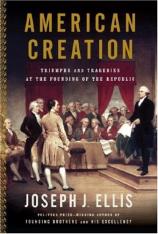American Creation: Triumphs and Tragedies at the Founding Of The Republic
Review
American Creation: Triumphs and Tragedies at the Founding Of The Republic
Joseph J. Ellis is a premier writer of American history. The
Ford Foundation Professor of History at Mount Holyoke College, he
has won the Pulitzer Prize (FOUNDING BROTHERS) and the National
Book Award (AMERICAN SPHINX). The historical landscape he surveys
in his latest work is nothing less than the entire crafting of the
new American nation, before, during and after the Revolution.
No portion of the book better defines the character of the
leadership of the United States in its infancy than that which
details "The Treaty" between white Americans and the native peoples
then known as Indians. As Ellis sagely comments, whereas Great
Britain would go on to further conquest and domination in the world
theater, the other losers in the American Revolution, the Indian
tribes, would have no "second act."
"The British defeat triggered a tidal wave of western migration on
the part of settlers who understood the phrase 'pursuit of
happiness' to mean owning their own land." This would require the
absolute conquest of the Indians wherever found. It was
incumbent on three people to act on behalf of both the Indian
tribes and the white settlers: President George Washington,
Secretary of State Thomas Jefferson and Secretary of War Henry
Knox. They had no intention of removing the Indians, because, as
Ellis puts it, "revolutionary fires still burned inside them and
they knew, deep down, that Indian removal was incompatible with the
republican values they cherished." Washington brooded that failure
to solve the Indian problem would be a permanent stain on his
reputation and bode ill for the new republic. Jefferson, more than
any of the others, believed Indians to be equal to whites but for
their culture.
Together, this triumvirate attempted to shape a model for future
generations by making a firm treaty with the Creek tribe of
Mississippi that was led by a racially mixed and
diplomatically savvy chief by the name of McGillivray. McGillivray
had no reason to trust the whites, as he and his people had seen
treaties broken since the incursion of Europeans onto American
soil. But after lengthy negotiations, the Treaty of New York was
duly signed, and the Creeks sang a song of "perpetual peace." This
treaty, like all others, proved unenforceable; Washington decried
the "land jobbers" who, in their zeal for territory, constantly
broke over into the newly delineated Creek homeland. McGillivray
went for help to the Spanish, thus exacerbating the conflict on
America's southwest border.
Ellis points out that one failing of the Treaty of New York was
that it was a "top-down" operation engineered by Washington, Knox
and Jefferson, the sort of fiat that heretofore had been reserved
for monarchs. For that reason, if no other, it was
unsustainable.
AMERICAN CREATION traces with fine lines the earliest
stirrings of democratic thinking that led to the formation of our
government. The congressional representatives had to contend with
the argument that they, by their aristocratic heritage, were
in danger of ignoring the men who wore "leather aprons" ---
and Abigail Adams was only too pleased to remind them that they
ignored women at their peril. Her gentle admonition "Remember the
ladies" was no doubt a constant and considerable irritant. Nor did
it help that an anonymous letter was received by John Adams in
1775 asking, "Whot has the negros the africans don to us that shuld
tak them from thar own land and mak them sarve us to the da of ther
deth?" --- and pointing out that "the gentelman that leads the
army" was a slaveholder. It was Abigail who succinctly queried, "If
we separate from Great Britain, what code of laws will be
established?"
That "code of laws" and its establishment are the essence of this
artfully conceived and finely researched book, which strives
like no other to present the American founders as human beings
engaged together in an exciting workshop of ideas --- ideas
with living and lasting consequences. Partly because the founders
were unable to deal adequately with certain issues such as slavery
and the Indian question, or with the proper balance between federal
and states rights, Ellis contends, "The very purpose of government
was subtly transformed from an ultimate arbiter to a framework for
ongoing argument." This left room for great leaders to follow, new
solutions to be sought and found --- and further argument.
Reviewed by Barbara Bamberger Scott on December 22, 2010
American Creation: Triumphs and Tragedies at the Founding Of The Republic
- Publication Date: October 30, 2007
- Genres: History, Nonfiction
- Hardcover: 304 pages
- Publisher: Knopf
- ISBN-10: 030726369X
- ISBN-13: 9780307263698





